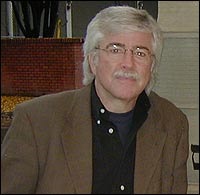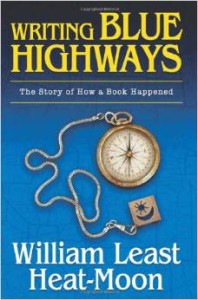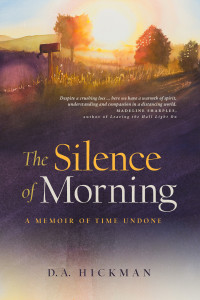“Beware thoughts that come in the night. They aren’t turned properly; they come in askew, free of sense and restriction, deriving from the most remote of sources.” ― William Least Heat-Moon, Blue Highways
- As his fans likely recall, the first edition of Blue Highways stayed on the New York Times bestseller list for 42 weeks in 1982-83. Not bad for a first book. Of course this was just the first of many for Heat-Moon.
It’s my pleasure to share a short interview with the prolific author, William Least Heat-Moon. Many of you know his work from the wonderful classic, Blue Highways. I recall reading somewhere that Heat-Moon was a “travel writer” because his books often focus on geography. But this isn’t remotely accurate in my estimation.
Heat-Moon’s books (including: PrairyErth, River Horse, Roads to Quoz, Here, There, and Elsewhere: Stories from the Road, Columbus in the Americas, and Writing Blue Highways: The Story of How a Book Happened, etc.) are an in-depth look at significant experience as framed by a certain geography. The “sense of place” is nearly a central character in many of his books, as he (birth name, William Trogdon) deftly weaves intriguing layers of perception and knowledge into a cohesive, often revealing, statement.
“Literature that keeps employing new linguistic and formal modes of expression to draft a panorama of society as a whole while at the same time exposing it, tearing the masks from its face – for me that would be deserving of an award.” — Elfriede Jelinek

“Memory is each man’s own last measure, and for some, the only achievement.”
― William Least Heat-Moon, Blue Highways
- I hope you enjoy the brief Q & A that follows.
1) Would you still become a writer IF you knew then what you know now … about the process, the time, the politics? Yes indeed.
2) When Blue Highways enjoyed such lasting success, how surprised were you? What did your success tell you about your readers, the world itself?
Beginning writers, in their innocence commonly imagine their first effort as drawing massive sales. I was an innocent when BLUE HIGHWAYS appeared, but twelve previous rejections of the manuscript tempered my expectations. The world of readers contains enough intelligent people who will seek out quality writing, even quality writing that challenges. It’s agents and young editors who lack foresight about the possibilities of a truly well-written book.
3) Your book about writing Blue Highways is a wonderful take on the realities of the writing process. When you spoke about your commercial publisher not “getting” the book … I can imagine your frustration. Luckily, University of Missouri Press had a different vantage point. But in many ways, wasn’t this development simply part of the Blue Highways experience, as you continued to chart your own course regardless of what others labeled significant, important, or worthy?

4) As you know, I have prairie roots in Dakota … geographic roots that evolved into spiritual roots, such that I wrote about in my book about prairie wisdom … which is really a kind of life wisdom. If you were to live in the middle of nowhere at this point in your life, would you miss the rest of the world? Or would you just sit down and write another book?
I’ve spent time in many places across America that could be called pockets of deprivation. For dozens of reasons, they are not for me beyond a week or two–but that week or two can be highly informative and often damn delightful.
5) Last question, is writing a lonely and isolating occupation OR is it the grandest form of freedom available to us? Annie Dillard, in The Writing Life, notes: “I do not so much write a book as sit up with it, as with a dying friend. During visiting hours, I enter its room with dread and sympathy for its many disorders. I hold its hand and hope it will get better.” Does this description resonate with you, or not really?

- I began this shiny new year in SunnyRoomStudio by considering how smallish changes can deliver significant impact … often in ways that surprise us with their staying power. Looking upward more frequently to study the sky, for instance, can yield a needed change in perception, a calming pause in a hectic day, a chance to connect with nature and something beyond our immediate environment. It doesn’t require a financial investment or ask to be scheduled into our day.
- So, today, I wanted to mention another smallish change with wonderful potential. Give something away as often as possible. Big or small … make it a spiritual practice. Find things around your home that someone else needs more than you do. Letting go of “things” can remind us of the temporary nature of life, and help us build a bridge to others at the same time. Let me know how it goes, what ways you find to extend or refine this idea. Small changes are the magic of our lives!
bonds of connection and understanding; a determined and inspired spiritual journey.

“When I began writing this book I wondered what was left to say, to do, after a sudden death.
When everyone had returned to schedules, routines, and responsibilities that were insistently framed by
calendars and clocks, not by the stirring passion of grief–and I felt alone like never before.
Is that where the conversation ends, I’d wondered.”
- I’ll be back on Monday, February 15th with another smallish change that holds the promise of something more. Thanks so much for dropping by!!
Blog by SunnyRoomStudio: all rights reserved.
About my 2014 book release …
Always Returning: The Wisdom of Place is about digging into our surroundings to unearth an organic, timeless wisdom. If you’re looking for inspiration or want to lean more about a landscape, a place, that helped me to unearth my spiritual roots, this is a book you’ll enjoy. We are much wiser than we imagine; it’s only a matter of tapping into what we already know. ~ D.A. Hickman
